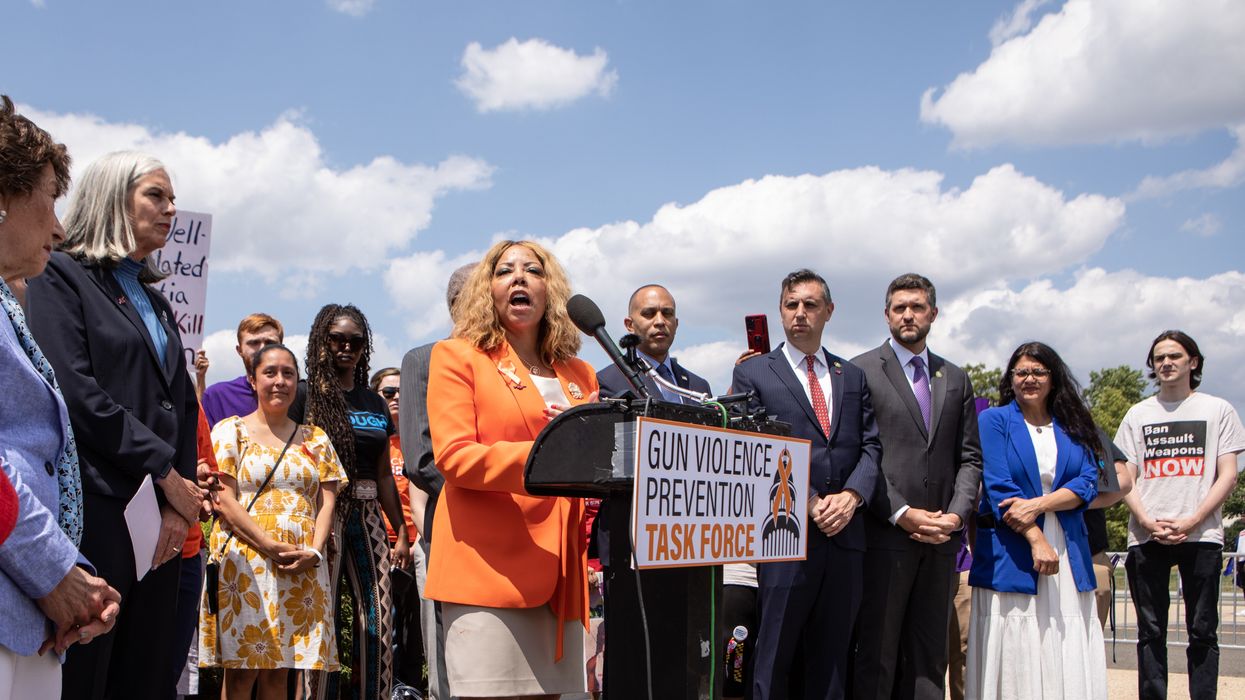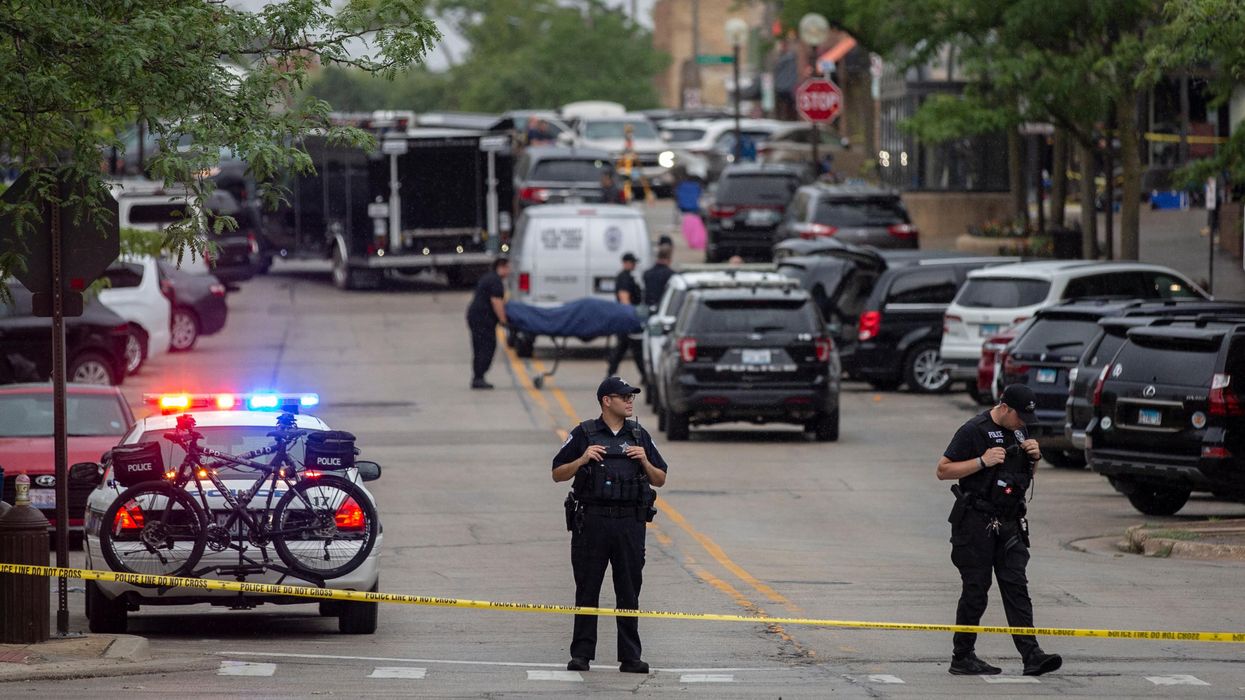‘Good Guys’ with Guns Are Fucking Useless in Stopping an Armed ‘Bad Guy’
A new DOJ report on the shooting in Uvalde, Texas, is laced with vivid and horrifying detail on the failings of law enforcement, themselves fearing the AR-15 weaponry in the hands of the 18-year-old shooter.
Remember those twisted words by Wayne LaPierre, then leader of the National Rifle Association, just days after the
mass murder at Sandy Hook Elementary School in December 2012? Standing there proudly up on the stage, he said: “The only thing that stops a bad guy with a gun is a good guy with a gun.”
This January LaPierre resigned from his NRA leadership position ahead of the trial on charges of corruption by the State of New York. But his words after Sandy Hook sadly live on despite repeatedly being shown to be total bullshit. Glaringly so in the review of the 2022 mass shooting in Uvalde, Texas, by the Department of Justice (DOJ), released on January 18.
DOJ’s 575-page report, available in English and in Spanish, is laced with vivid and horrifying detail on the failings of law enforcement, themselves fearing the AR-15 weaponry in the hands of the 18-year-old shooter. Failings causing preventable death. Failings in providing adequate emergency medical care to wounded victims after law enforcement finally entered the classrooms. Failings as dozens of trained officers stood idly by without a leader armed to the teeth with their own AR-15-style firearms.
Here are the opening words by Associate Attorney General Vanita Gupta at the news briefing where the DOJ report was officially released, remarks following those by Attorney General Merrick Garland:
The Attorney General just gave a sense of the detailed timeline we have laid out, and the cascading failures that occurred over the course of the 77 minutes between when law enforcement arrived on the scene and when they finally entered the classroom. But we also know the pain—and the failures and missteps—did not end when law enforcement finally entered the classrooms and rescued the survivors.
It continued at minute 78, when it became clear that because there was no leader, there was no plan to triage the 35 victims in classrooms 111 and 112, many of whom had been shot. Victims were moved without appropriate precautions, victims who had already passed away were taken to the hospital in ambulances, while children with bullet wounds were put on school buses without any medical attention. In the commotion, one adult victim was placed on a walkway—on the ground outside—to be attended to. She died there.
As difficult as the vivid words in the report are to ignore, I am not naive. If history is any guide, some in Congress will mightily try to discount the DOJ report, continuing to block any subsequent movement on meaningful gun-control measures. Republican lawmakers in solidly Republican states, as a detailed article in The New York Times describes, are fraid their voter base would vote them out of office if they show any hint of supporting gun-control measures. Those Republicans are waiting for the report to fade away in the news cycle to collect dust.
But then, the victims of the gun carnage in Uvalde, and those before, deserve more than letting the report die buried in dust. They deserve someone taking the debate to the naysayers in Congress and state legislatures armed with hard facts about the effectiveness of gun-control measures, framed by the realities of having none in a gun-friendly state like Texas where the brutal carnage within Robb Elementary School happened. Yes, there is an association between lack of gun regulations in a state and the occurrence of mass shootings, as I describe below.
Here are some of the arguments I would make today replying to some of the naysaying comments (bolded below) common among members of Congress downplaying any need for gun control:
Gun control does not work and won’t reduce gun violence.
Wrong. Take requiring gun licenses, as required in a minority of states today. In his review of studies, Garen Wintemute, who directs the Violence Prevention Research Program at the University of California, Davis, writes in Health Affairs that license requirements for gun purchases “have repeatedly been associated with reduced rates of [gun] violence.” This body of research is clear.
Furthermore, Michael Siegel at Boston University and his research team found, as reported in Law and Human Behavior, that requiring one to get a permit to purchase firearms was associated with a 60% lower odds of a public mass shooting occurring in a state, controlling for state characteristics like population. Other researchers found the same thing.
Why? Because licenses to purchase firearms typically entail in-person applications and background checks involving multiple databases and, among other things, taking a gun safety course. Basically a more comprehensive examination than standalone background checks singularly taken at the point of a firearm sale.
Congress already passed the Bipartisan Safer Communities Act (BSCA) in 2022. Nothing more is needed.
Okay, but the BSCA basically only includes more funding for mental health initiatives.
Well, mental illness is the cause of most gun violence, especially mass shootings.
I agree mental troubles underlie many suicides, by firearms and otherwise. And extreme-risk or “red-flag” laws encouraged via funding in the BSCA have been shown to reduce suicides.
But research repeatedly finds that psychiatric disorders, as a comprehensive review by Rand Corporation concluded, are not the principal driver alone across the spectrum of firearm violence. And that includes not being a predictable factor in mass shootings. Sure, after a mass shooting, politicians and media search hard to find a motive and signs of mental troubles; retrospective interpretation to justify mental illness alone as cause. Retrospective interpretation, I submit, many of us not owning a gun would fail.
But an assaults weapon ban is going too far. Based only on the threatening appearance of guns, nothing more.
Maybe the 1994 ban automatically expiring in 2004 was based too much on physical appearance instead of functionality. But today, as criminologist Thomas Gabor and former ATF agent Julius Wachtel have each argued, a ban can be based on objective ballistic lethality, scoring firearms on components including caliber, muzzle velocity, firing rate, ammunition capacity, loading mechanism, and ability to add accessories that increase lethality.
Wachtel in his 2015 article in The Washington Post describes one extreme lethal ballistic feature about AR-15-style semi-automatic rifles. With “their most common calibers—7.62 and .223—these weapons discharge bullets whose extreme energy and velocity readily pierce protective garments commonly worn by police, opening cavities in flesh many times the diameter of the projectile and causing devastating wounds.” Hence, a herd of law enforcement personnel at Uvalde afraid of the weapon in the shooter’s hands milled around aimlessly for over an hour before doing anything.
And such carnage Wachtel describes was visited upon the children and teachers in Robb Elementary School on that fateful day in Uvalde, Texas.


